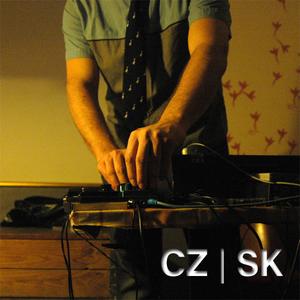First of all, can you give us some background on Gurun Gurun? How long has the band been active, what are your influences, artistic goals, etc?
Gurun Gurun is a Czech-based experimental, weird ambient & improvised music collective formed in the autumn of 2007. Members of GG are currently Tomas Knoflicek, Federsel, Ondrej Jezek and me. Tomas in addition to GG deals with interdisciplinarity in the arts, especially with the relationship between image and sound. I used to play with him in the band Miou Miou (MintyFresh, Rallye Label). Federsel is one of the founding members of Handa Gote, which is a Prague-based project concerned with the research and development of movement theatre, design theatre, music and sound design and the integration of science and technology in art. Ondrej is, I suppose, the best Czech producer and sound engineer, now. He is active on the punk/noise scene, mainly. His home label is Silver Rocket.
We have recently released Gurun Gurun's debut album on Ian Hawgood's label Home Normal. There are special guests on the album, among others Moskitoo, Sawako, Opiate, Aki Tomita, Irena & Vojtech Havel, Floex. A remix album 'Gorogoro Garagara Rimikkusu' was released in August on the Home Normal label, too.
Can you explain the mix in context of your interests and tastes, and what we should know about Czech and Slovak music today.
I think that experimental, electronic and improvised music is currently the most interesting of all the music emerging in our country. This audio-visual scene is very dynamic, with new netlabels, bands and projects. I used some recordings from Prague's improv concert series 'Wakushoppu' in my mix. There are also great festivals like Movement - Sound - Space in Opava, Ostrava Days, Ostinato in Ceske Budejovice, a concert series MENU in Hradec Kralove etc.
Musicians like Martin Burlas, Miroslav Posejpal or Ivan Palacky were active on the Czech and Slovak alternative scene before 1989. On the other hand, Stranglet, Selectone, Strom Noir or katsa.theo are brand new names. These musicians belong to a generation that is not so much burdened with the communist past of our country.
Many of these artists, perhaps all, are unlikely to remember the Velvet Revolution or what it was like before the collapse of the Soviet Union. Certainly the 90s must have been a time of great change, of forging new identities and so on. Was there an influx of new music and styles? How did electronic and noise music develop in these countries? Were German, Italian, British and Japanase records available? If not,were there any pre-89 precedents? How might the Soviet period have influenced the course of Czech and Slovak music?
Also, can you help situate the pre-89 avant-garde within larger historical and cultural movements if possible?
There were only three national labels, a terrible state radio and two national TV programs in the former Czechoslovakia before 1989. It was a time of darkness. All media were censored and served the communist propaganda. Communists hated everything independent and what could not be supervised. So, it was impossible to come out with an alternative and experimental music officially. Artists from Belarus have quite a similar experience at this time. During that era it was not possible for example to buy musical instruments and professional audio equipment. Underground and alternative musicians could only distribute their recordings illegally on home recorded audio tapes. The possibility of touring was very limited. Private concerts were often broken up by the police. The musicians of the famous band The Plastic People of The Universe were even imprisoned.
Good records from Western Europe could only be found in Poland and Hungary. However, even there the choice was very limited. The only thing to come out in Czechoslovakia was awful Italian pop. If something came out, it would be a Dire Straits' album once every 10 years. This isolation from the outside world has paradoxically led to the creation of highly original bands whose sound can hardly be compared to anyone elses. A good example of this is the so-called Brno alternative scene: artists like Iva Bittova, Dunaj, E, Jeste jsme se nedohodli etc.
Everything completely changed after the Velvet Revolution in 1989. The next decade was very euphoric. Underground artists such as DG 307 or Sleepy Motion could suddenly release records. Listeners and musicians discovered new music and styles (mainly from the UK and the U.S.), including for example 30 years old recording that they had never heard before and which were new to them, too. They discovered Madonna as well as Stockhausen, My Bloody Valentine or even German krautrock from the 70s. New recording studios, labels, new clubs emerged. Czech bands Here and The Ecstasy of St. Theresa recorded a John Peel Session ... Things had started to move in the right direction.
The Soviet period made it impossible for several generations of Czech and Slovak musicians to create, to record, to give concerts and to cooperate freely with labels and artists from abroad. It had a destructive effect on many of them. I think, the consequences of this abnormal situation are still visible today. In particular, I think contemporary Czech and Slovak musicians lack self-confidence. Thats why our music scene is practically unknown. There are great artists here, and it is time for you to get to know them.
CZ/SK mix curated for The Silent Ballet:

|